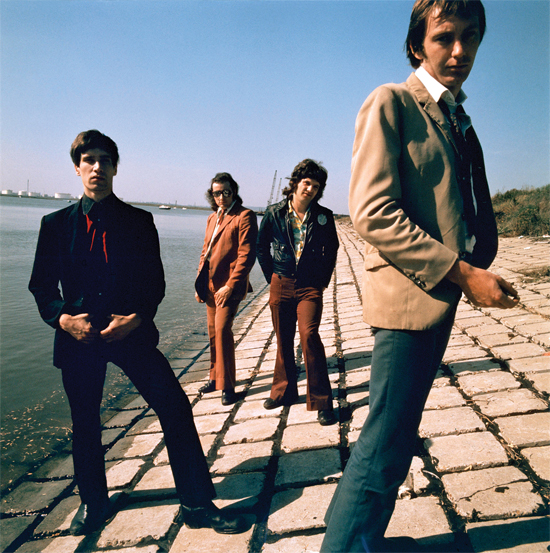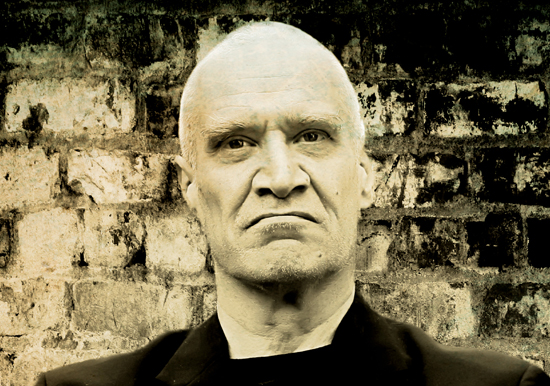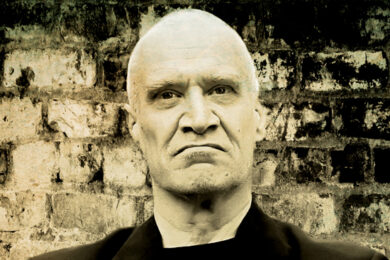Before you read on, we have a favour to ask of you. If you enjoy this feature and are currently OK for money, can you consider sparing us the price of a pint or a couple of cups of fancy coffee. A rise in donations is the only way tQ will survive the current pandemic. Thanks for reading, and best wishes to you and yours.
Never climb inside a haystack
I was born in 1947 on Canvey Island. Canvey at that time was a bit like the Wild West. People lived in bungalows and railway carriages. A lot of the roads weren’t made, they were just tracks. I remember there was also this huge haystack opposite my school, the size of a building. When they built these haystacks, they had to leave ventilation through it or it would catch fire from the heat inside. There were tunnels going inside, and the kids could climb right inside this thing, there was almost a room in there. When I think about it now… I mean, we used to play there… That fucking huge haystack burnt down. It might have happened in the night but man, that could have happened when it was full of kids. This is not the fault of Canvey Island, but I grew up with the feeling that it was fairly shameful to come from there. When we used to go up to Sheffield to visit relatives, or Sussex to visit family on this bloody farm, I was always aware that there was something a bit shameful and I didn’t know why. My mum, it used to radiate from her. Kids can really feel things, you know?
I remember being really freaked by people who were Tories
My dad wouldn’t let my mum speak to anybody who he thought was a Tory, and his definition of a Tory was somebody who wore a tie. How true that is, I don’t know. Most of the boys at the grammar school in Westcliff, where I went after I passed the 11 Plus, lived in Thorpe Bay and places like that, their fathers tended to be accountants and so on. It was right in the middle of a very middle-class area. It was nothing oppressive or anything, but there were jokes about people living in tin-cans on Canvey and things like that. It was seen as a bit of a joke to come from Canvey and people wouldn’t go down there. No.
The idea I was ‘illegitimate’ pleased me immensely
After my mother had died, we were going to move into the bungalow in which we’d grown up with my brother and his wife. I remember being in what had been my mum’s bedroom and on top of the wardrobe there were all these papers. I found an envelope and inside of it was my parents’ marriage certificate, our birth certificates and things… and suddenly I’m realising, ‘Hang on, I was born just about the same time they got married, and my sister would have already been three years old.’ That’s why it was so shameful! They had been living in sin! I knew my father had been married before and was divorced and so on, but I had never fitted everything together. In those days this was heavy, heavy, heavy. That was why I had that feeling of shame, we’d go up to Sheffield and my mum would come in with her brood of bastards! The idea that I was illegitimate, if you like, pleased me immensely. I’d think, ‘Well, I shouldn’t be here! I got in for nothing.’
One of my earliest memories of Canvey was the flood in 1953
It was a terrible night, the sea wall collapsed and about 50 people died. All I remember was my mum gathering us together, and I looked out of the back window at the fields, but there were no fields, it was the sea, there were waves, waves coming in. They were evacuating the island and we got taken off the island up the hill to the King John’s school where about 20 years later I would be a teacher. We went from there up to Sheffield to be humiliated. Actually the people there were very nice, lovely people. When we got back there were RAF lorries with blow-heaters, trying to dry these cardboard houses out. Our house was a write-off.
My father never recovered from the flood
Everyone had been evacuated but certain people, including my dad who was a gas-fitter, had to remain behind. My dad spent a fair amount of time wading chest-deep in freezing water. He went down with a terrible case of pneumonia, it did destroy his health. Canvey was still very open and in the autumn you’d get these mists and fogs, some of them are incredible, like stage-sets. My dad gradually got worse and worse each winter when it was foggy. He couldn’t do his gas-fittings, he used to ride around on a bike. They gave him a job in the stores and I remember in my teens they used to drive him home from work in a van. We’d normally hear the van, the door slam and then you knew he’d be coming in. One evening we heard the van, and time went on. We’re thinking, ‘He’s not there…’ We ran out into the fog and he’s collapsed, lying in the road. We dragged him indoors, he couldn’t breathe. I was freaking. We had to get a doctor… I mean, I was never very fond of my dad to put it mildly, but I ran to the doctor’s. The doctor took quite a long time before he did actually come, by which time the crisis was kind of over. He was telling my mum, ‘Look, you’re making too much of it, it’s not as bad as it looks.’ In fact, he died within the year. The flood caused that.
Now if there’s a disaster people are steaming in there to counsel you but there was nothing like that then
People were trying to mend their houses but everything was ruined. There was some international relief: I’d just started school that year, and I remember at the end of the day they’d march us down to a room at the end of the corridor and in this room there was all this stuff, a can of sardines from Norway, a box of raisins from California, and also because this flood had happened just after Christmas, all the kids had lost all of their Christmas presents and everything. There was one room that was great, it was just full of toys, shops had sent them. You’d get your raisins and sardines and whatever but then you could pick one toy. They had a whole lot of these Delta winged aeroplanes with a friction drive, you push them along the floor. I really wanted one of them, but every time I went somehow or other I didn’t get one. So I missed out on that! A lot of furniture was sent, carpets. Everyone on Canvey for years after, we all had ‘flood carpets’, they were just second hand carpets but everybody got a flood carpet. For years later, you’d go round to people’s houses and everyone had the same kind of furniture!
After meeting Lee Brilleaux for the first time, my brother and I were saying, ‘That guy!’ We remembered him
When I first met Lee, I had this jug band with my brother – we didn’t have a jug, actually, but "jug band" sounds nice. It was me playing the violin and harmonica, my brother playing guitar and banjo and our friend on the tea-chest bass. We used to go busking on the seafront on Canvey Island, we’d put all the guitars in the tea-chest and carry it down between us. We just played Leadbelly songs, ‘You Are My Sunshine’, ‘Irene Goodnight’… Anyway, one day we had been playing, and these three boys came up. I was 18 at the time, and these boys were like 13, 14, which is a big age gap. Kids. But one of them in particular, Lee, was very, very interested in what we were doing, he was questioning us. Even then, Lee had such a personality, a self-possession. He was impressive. These three boys were Lee, Sparko and Chris Fenwick, who went on to be the manager of Dr Feelgood. Anyway, they decided to do this, to form their own jug band, which they did. They were pretty good. Some years later I was walking along the road and coming towards me is Lee, he looked really great. He was wearing a three-piece pinstripe suit, sideburns, he did look fucking mean. He tells me this band of his had evolved into a rhythm and blues band, an electric band. The guitar player had just left so they didn’t have a guitar. I didn’t say anything, and for his part, Lee didn’t say anything either. We wanted to do this, but we were a bit too… I don’t know. Anyway, it was all solved later that day, Sparko came knocking on my door and said, ‘Do you want to join our band?’ That’s how Dr Feelgood started.
I have a special feeling about the Thames Estuary, and it ain’t to do with Julius Caesar
I love to be at the Lobster Smack pub on Canvey and go up to the western end of the Island where there are all the creeks, or to stand and look across to the Shell Haven refinery and you see all the ships and buoys. There’s just something about it. Up by the Lobster Smack, I feel just like Wordsworth felt about Windermere. Obviously that’s all wrapped up in memories and whatever, but it’s one of the most expressive landscapes I know and I get a kind of spiritual uplift from it, always. You get magnificent skies, huge sky, and the river is so broad, which leads to all sorts of effects of sunlight, and you’re getting this kind of spectacular natural beauty just from that, but the whole thing… it stirs something in me. I don’t know what it is, sometimes I try to explain it, you know, Julius Caesar probably came sailing up there, but it ain’t that. There is a feeling though, when you look across the river, of continuity. There have been human beings on this river for more than 2,000 years, much more. But also when I look over at Canvey, I think of Irene [Wilko’s late wife]. Looking at the island and thinking of her, it’s really good. It’s heartbreaking sometimes, but good. That’s all personal association but there is something more that I can’t really put into words. It ain’t to do with Julius Caesar.

I wish I could go back in time and slap myself around the head…
I look back on Dr Feelgood sometimes and I would do a lot of things differently. Oh man, I was intolerable. But it was their fault, what happened [laughs]. Sometimes I like to imagine that I’ve got a time machine and I could whizz back and see myself when I’m 21 or 22 and I’d really like to slap him around the head and say, ‘You idiot! You don’t know!’ And I wish I could do that when Dr Feelgood really started to go wrong, that final year. If I could go back now and just explain to myself what’s really happening, I could have behaved in much better ways. But it was one of those things, bad feelings building up, you don’t communicate with people. I remember there was one period when, probably between American tours, this animosity had started to grow between me and Lee. But Lee would come round to our place on Canvey with a bottle of alcohol, whatever he drank, and he’d sit down and I’d be sitting opposite, and I knew he was coming round to be friends. We maybe didn’t speak much but that’s what I was trying to do too, I really appreciated the way he did that.
I can’t be a complete bastard…
People have been saying that in the Oil City Confidential film there’s this scene, we’re sitting around a table by a lake talking, apparently in Finland. Anyway, people have been saying, ‘In that interview, Lee Brilleaux is looking very hostile towards you.’ All I can remember is that I’m sitting there being a right rock star [laughs]. That’s all I remember of it, looking at my pose, which was rather good. All this time I’ve never said a bad word about Dr Feelgood, and a few people interviewing me recently have said the film’s really good because there’s no bitching. But now I’m starting to get all these bits of evidence! They were all bastards! [laughs] I can’t be a complete bastard because I’ve been working with Norman Watt Roy all of these years and we’ve never had fights!
I no longer worried about stage fright when I joined Ian Dury And The Blockheads
When I joined the Blockheads they were pretty big, doing big shows. Being able to go on and you haven’t got a qualm. Stage fright? Forget it, that’s Ian’s job. You just go on in front of huge audiences and play, and play with such a rhythm section. It was a great rush to start a show with ‘Sex and Drugs’, bloody hell, it was something else. So it was just all enjoyable to me, it was great, thinking ‘Ian’s the boss, I just have to do my job.’ All of their baggage, and there were a lot of heavy disputes going back a long way, and of course none of it was anything to do with me. Sometimes there were fantastic outbursts, and there was nothing to personally offend me. Quite often if Ian was out of control, they’d come and get me. He tyrannised the Blockheads to one degree or another, he enjoyed emotional manipulation, but I really dug this guy, loved Ian. But ooh dear, he could create a problem. All of these terrible arguments were highly entertaining to me.
Advice for musicians? Get a proper job
A long time ago I gave up asking why I do it. I just do it because I do it. It was never an ambition of mine. Like Dylan [Howe, Wilko’s drummer], he was born to play drums, you know, and Norman the same really. But for me, it was something that just happened to me. I never really intended to do it. Certainly back then, I did all the rational things you would think. I had to take this decision where I either carried on painting or chose rock & roll. I thought, ‘Yeah, this will be four or five years, I’ll make a lot of money and go on from there’. That’s absolutely the sensible way to look at it. If somebody had told me then that I would still be doing it in ten years, that would seem mad. If somebody had said, ‘You’ll be doing it when you’re 64,’ it would seem like a joke. I think I’ve spent all my life really just following the line of least resistance. That’s what I do. If I didn’t have Norman Watt-Roy, it’s quite possible I would have left music by now. I can remember a couple of periods in between The Blockheads and things when I didn’t really have great musicians in the band, it was OK but something could have happened then that would have made me quit, I don’t know. In the early days, I was always going, ‘I’m gonna quit!’ All the time. I thought after five years I’d have lots of money, and I’d go back to University because I’d have the means and study Mandarin, which seemed like a good way of getting out of the rock & roll life into something else. There was always this kind of vision that when I got old, I would be wise! Not true! I’d have a vision of me sitting at my desk with all these beautiful volumes and a shaft of light coming through the window and I’m reading some Icelandic saga or something, and some student would come in with a heavy problem and I’d be really wise. But no. I couldn’t give anyone any advice about music. You’ve just got to go with your feelings if it’s what you really want to do. People have so many different motives for it. If you’re fortunate you can make a living. Many, many people just want to make a living so they’ll play in a tribute band or something, some people just dig doing it so much they’ll do something they don’t really like. You just go with your feelings. There were a lot more feelings when Dr Feelgood happened, all of a sudden you were experiencing all these things, and you’re thinking about what you’re doing and theorising. You don’t feel like that after a while. I haven’t got any theory at all.
The Dr Feelgood – All Through The City, a box-set of the first four Dr Feelgood albums, unreleased material and a DVD, is out now on EMI Looking Back At Me – by Wilko Johnson and Zoë Howe is published by Cadiz Music (the production company behind Julien Temple’s Dr Feelgood documentary Oil City Confidential) on June 4th. You can pre-order from Amazon here at a discounted rate



